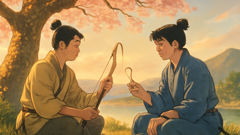Introduction
In the soft hush before dawn, when the mist curls low along the mountain slopes and the ocean’s breath stirs the sleeping pines, ancient Japan whispers stories older than memory itself. Among these, the legend of Hoori and Hoderi stands radiant—a tale spun from the woven threads of rivalry, longing, and the shifting tides that unite sea and mountain. The brothers, sons of the celestial deities Ninigi-no-Mikoto and Konohana Sakuya-hime, were as different as stone and surf. Hoderi, known as Umisachi-hiko—the Luck of the Mountains—was a masterful hunter, swift among crags and forests, his arrows keen and sure. Hoori, called Yamasachi-hiko—the Luck of the Sea—was a fisherman of rare patience, whose heart was drawn to the secrets hidden beneath the restless waves. Their lives, in balance like the world they inherited, seemed destined for harmony. Yet, in the heart of every legend, destiny coils with conflict, and what begins in peace often drifts toward discord. A single, fateful exchange—born of curiosity, pride, and brotherly affection—would unravel their bond, sending Hoori on a journey that crossed realms, courted the wrath and grace of gods, and changed the story of Japan forever. As the sun rises on this story, the mountains glow with promise and the sea glimmers with secrets, waiting for the echo of footsteps and the cast of a fisherman’s net. The tale of Hoori and Hoderi is not just one of gods and men, but of the fragile threads that bind siblings, the restless search for forgiveness, and the eternal dance between land and ocean.
The Brothers’ Exchange: The Hook and the Arrow
Hoori and Hoderi, though born of the same divine lineage, were bound by different loves. The mountains called to Hoderi with their wild, unbroken promise—his footsteps silent on moss, his eyes sharp for deer moving through cedar shadows. Every morning, he set forth with a quiver on his back, the world sharpening to the string of his bow. His arrows struck true, and the forest answered his prowess with abundance. Meanwhile, Hoori was drawn to the sea’s restless song. His days began with the taste of salt and ended with the ache of longing for mysteries just out of reach. He was patient, listening to the wind and tide, learning how the fish hid among rocks and kelp. When his net came up heavy, he felt the sea’s blessing—a silent pact between fisherman and ocean. Their harmony was undisturbed until one quiet afternoon, as golden light pooled at the edge of the woods. The brothers, resting beneath a cherry tree in blossom, spoke idly of their trades. Hoori, perhaps envying his brother’s easy success, suggested a swap: let Hoderi try his hand at the sea, while Hoori would hunt among the hills. It was a simple exchange—no more than a brother’s game. Hoderi agreed, confident in his luck, and handed Hoori his prized bow and arrows. Hoori, in turn, received the shining fishhook that had never failed his brother. That night, the balance of their world shifted. Hoori’s hunt proved fruitless. The forests held their breath; not a single deer or boar crossed his path. Hoderi fared no better—his nets, once heavy in Hoori’s hands, came up empty, the sea refusing to yield even a single silver fish. Frustration crept in. On the third day, Hoori’s clumsy arrow struck only stones, and his heart grew heavy with shame. Hoderi, at the shore, cast again and again, until in a moment of carelessness, he lost Hoori’s precious fishhook to the churning surf. Panic seized him. He searched the foaming water until his fingers bled, but the hook was gone. When he returned, shamefaced, to his brother, Hoderi’s pride twisted his words to anger. He demanded the return of his hook, threatening storms and curses if Hoori failed to deliver. Hoori, stricken with guilt, combed the shore day after day. He sifted through sand, peered beneath rocks, but the sea kept her secret. His brother’s fury grew, casting a shadow over both mountain and beach. Their laughter faded, replaced by cold silence. At last, desperate for forgiveness, Hoori sought counsel from an old spirit who lived in a cave by the sea. The spirit, wise and weathered as driftwood, listened to Hoori’s tale and said, “The hook you seek lies not in this world, but in the kingdom beneath the waves—the palace of Ryujin, the dragon god of the sea.” With new resolve, Hoori fashioned a small boat from cypress wood and paddled out into the vast blue, where the sky met the water and the future waited, uncertain and deep.

Journey Beneath the Waves: The Palace of the Sea God
The sky turned from blue to indigo as Hoori drifted further from the shore he knew. The world above faded into silence, broken only by the cry of gulls and the slap of waves against his boat. He whispered apologies to his brother into the wind, hoping they might reach Hoderi’s wounded heart. Night fell. In its velvet hush, Hoori saw a silver path unfurl across the water—a road of moonlight that beckoned him onward. Then, as if drawn by fate’s own hand, a great wave rose and swallowed him whole. He fell not into cold darkness but into a world of shimmering light and drifting colors. The currents carried him to the gates of Ryugu-jo, the palace of Ryujin. It was a place built from coral and mother-of-pearl, with gardens of swaying kelp and walls that rippled like silk. Dragons and turtles glided through its halls; jewels shone like stars in an endless sea-sky. At the threshold stood Princess Toyotama-hime, daughter of the sea god. Her hair was black as midnight and her gaze deep as the ocean itself. Hoori bowed, stammering his plea. He told of his lost fishhook, his brother’s anger, and his own despair. Toyotama-hime listened, her heart moved by his honesty. She led him through jeweled corridors to Ryujin’s throne. The dragon god, immense and regal, considered the fisherman with ancient eyes. “Many have come to my palace seeking treasure,” Ryujin rumbled, “but few ask for so small a thing as a hook lost in sorrow.” He summoned his servants—carp with gleaming scales, crabs with clever claws—and bade them search every corner of the sea. Days passed in a blur of wonder. Hoori wandered the palace gardens, marveling at lotus ponds and singing shells. Toyotama-hime became his guide and friend, her laughter bright as morning surf. When the search at last yielded the missing hook—tangled in a red coral branch—Ryujin called Hoori to his side. Yet before returning it, he offered a choice: “Stay in my kingdom, where you may know peace and joy, or return to the world above, bearing not only your brother’s hook but a lesson for both land and sea.” Hoori hesitated. The beauty of Ryugu-jo was beyond dreams, but his heart longed for reconciliation with Hoderi. He asked for both forgiveness and wisdom to mend their bond. Ryujin smiled, granting him not only the hook but three magical treasures: the Tide-Flowing Jewel, the Tide-Ebbing Jewel, and a promise that their power might restore balance between brothers. As Hoori prepared to leave, Toyotama-hime pressed his hand. “Go with my blessing,” she whispered, “but remember—the sea keeps its secrets, and love may call you back.”

Forgiveness and Power: The Subjugation of the Sea God
Riding the currents that returned him to the world above, Hoori clutched the lost hook and the sea god’s treasures close to his chest. When he emerged upon the shore, days had melted into years; the world felt subtly changed, the mountains taller, the sea deeper. Yet his first thought was for Hoderi. He hurried home to find his brother waiting, face carved with anger and regret. Hoori knelt before him, offering the precious hook with open hands and humble words. But pride still burned in Hoderi’s eyes. He accused Hoori of trickery, of consorting with spirits to outshine him. Rage boiled over—he challenged his brother to prove his worth, to show that the sea’s luck was not greater than the mountain’s might. With sorrow in his heart, Hoori accepted. The next day, as dawn painted gold across the waves, Hoderi stood at the water’s edge, bow in hand. He loosed arrows at shadows beneath the surf, but the sea swallowed them whole. Hoori, drawing on Ryujin’s gifts, cast the Tide-Flowing Jewel into the waves. At once, the sea rose in a mighty swell, engulfing the shoreline. Hoderi’s feet slipped; he struggled against the churning waters, crying for help. Moved by pity and love, Hoori cast the Tide-Ebbing Jewel next. The waters retreated, leaving his brother gasping on the wet sand. This power—born not of vengeance, but of balance—humbled Hoderi. He bowed low before Hoori, weeping with relief and shame. For the first time, words of apology bridged the gap between them. “Brother,” Hoderi whispered, “your luck is great, but your heart is greater still. Forgive my anger.” Hoori embraced him, sorrow and joy mingling like fresh rain over earth. The two brothers made peace. In time, Hoderi recognized that each world—the mountain and the sea—had its own blessings, its own secrets and strengths. Their rivalry faded, replaced by mutual respect. Hoori’s power over the tides became legend. Villagers revered him as a god of fishing and plenty. Yet he never abused Ryujin’s treasures, using them only to bring harmony between land and sea. In gratitude, Toyotama-hime came to live with Hoori as his wife. They built a home near the waves, where their children would become ancestors to emperors. Yet even in happiness, Hoori never forgot the lesson of the lost hook: that pride and envy can drown the spirit, but forgiveness restores what is most precious.

Conclusion
So the story of Hoori and Hoderi lingers in the breath of wind across mountain pines and in the hush of dawn above the waves—a legend not just of gods and treasures, but of hearts tested and mended. Their journey shows that even divine blood cannot shield siblings from jealousy or sorrow, but it is humility, forgiveness, and understanding that restore what pride destroys. Through their trials, mountains and sea found harmony, and from their union came lineages that shaped the spirit of Japan. The tale endures, teaching that each realm—be it land or ocean, brother or sister—has its own fortune. When we honor what is different and seek reconciliation instead of conquest, we discover treasures deeper than any lost hook or magical jewel. The world is a tapestry woven from such stories, where even rivals can become guardians of balance, and every loss holds the seed of new beginnings.













